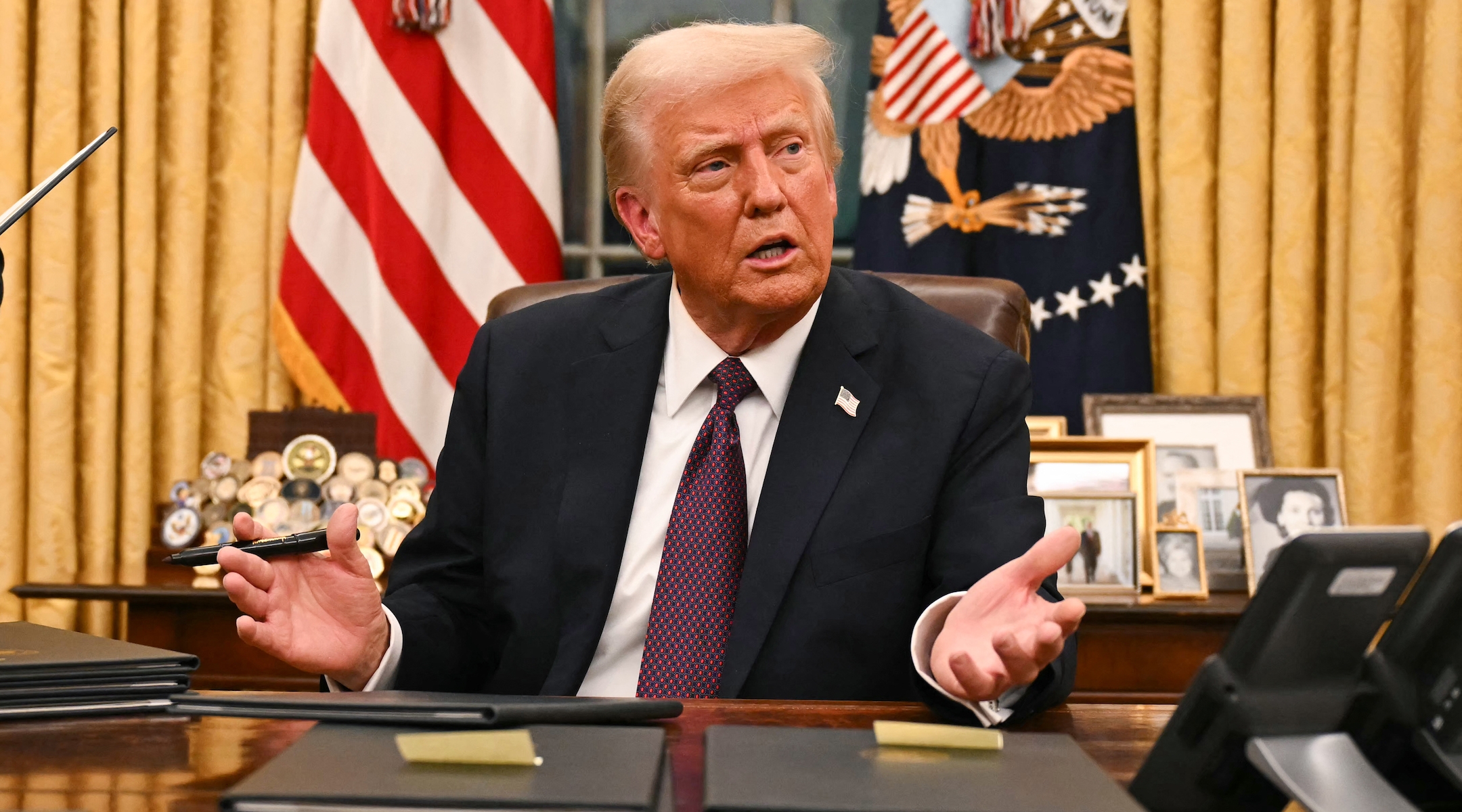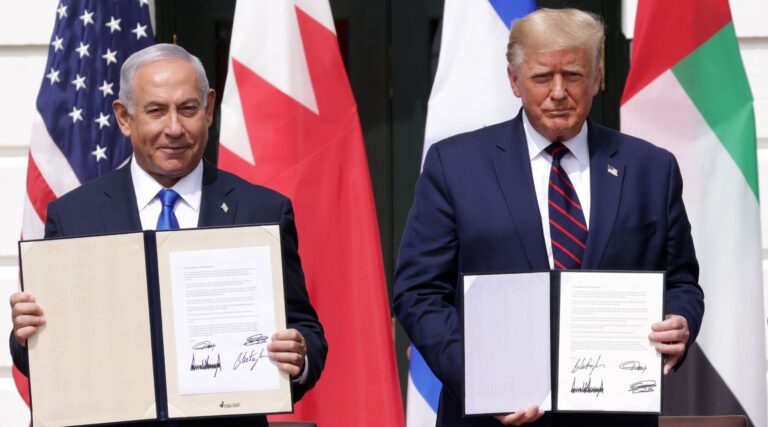Jeremy Ben-Ami did not want Donald Trump to win the election.
J Street, the liberal Israel lobby Ben-Ami leads, accused Trump of antisemitism and undermining democracy. It raised millions for Kamala Harris. It said a Trump White House “endangers advancing a resolution between Israelis and Palestinians,” adding, “he is not a friend of Jewish-Americans supporting peace.”
Then, just before Trump took office, Israel and Hamas agreed to a ceasefire and hostage release. It was the very deal that, for months, J Street had wanted Joe Biden to accomplish. By many accounts, it was Trump who helped push it over the finish line.
Now Ben-Ami and other liberal Zionists are asking a somewhat uncomfortable question: Is the president they opposed in fact their best hope? Could he achieve a treaty with Saudi Arabia? Real progress toward a Palestinian state?
Could Donald Trump make all their dreams come true?
“He is president of the United States, and he’s expressed an interest in getting done the ultimate deal,” Ben-Ami said. “We are supportive of anybody who’s going to try to advance that kind of agenda.”
Of course the case against Trump being a liberal Zionist is extremely obvious: He isn’t liberal. Both his past and future ambassadors to Israel, David Friedman and Mike Huckabee, support the settlements. His Israeli-Palestinian peace plan did not include an independent Palestinian state. In his first term, he embraced Israeli Prime Minister Benjamin Netanyahu’s priorities.
Some liberal Zionist leaders see all of that, and are girding for a Trump administration that will give Israel the green light to expand settlements and annex the West Bank.
And yet. Trump is the one who said the ceasefire deal “better hold.” Trump promised an end to “all wars” in his inaugural address. Trump has cultivated a reputation as a dealmaker. Trump brokered normalization agreements between Israel and four Arab countries.
Now, Trump wants an Israel-Saudi Arabia treaty. And it seems like that will only come at the price of concrete movement toward a Palestinian state, the longtime aspiration of J Street and its ideological partners.
“If at the end of four years what comes out of this is the beginning of the reconstruction of Gaza, and normalization between Israel and Saudi Arabia that has a real Palestinian component, those are things liberal Zionists have wanted for years,” said Michael Koplow, the chief policy officer of the Israel Policy Forum. “He certainly could end up advancing liberal Zionist goals more than any president in recent memory.”
But Koplow is skeptical that the ceasefire deal, which requires further rounds of talks, will succeed. And he said it’s also possible that Trump greenlights the annexation of the West Bank, a longtime right-wing dream. At this stage, he said, there’s no way to know.
“He could end up doing things that liberal Zionists love and he may end up doing things liberal Zionists hate,” said Koplow, whose group favors a Palestinian state alongside Israel. “I don’t think there’s a president that had such different paths ahead of him, where either one is plausible.”

US President Donald Trump speaks to journalists in the Oval Office on January 20, 2025. (Jim WATSON / POOL / AFP)
Right-wing pro-Israel fans of Trump certainly haven’t given up on him. While the ceasefire deal has unsettled many of them, they’ve noted that it could easily fall apart. The second stage of the agreement, which would see the Israeli army fully withdraw from Gaza, has yet to be negotiated. And Netanyahu’s far-right coalition partner Bezalel Smotrich opposes it, which might mean that Netanyahu’s political survival hinges on the deal failing.
If the ceasefire does fall apart, Trump’s supporters expect Israel to return to fighting — with the full support of the Trump administration. Trump himself said, shortly after his inauguration, that he was “not confident” about the ceasefire’s chances. “That’s not our war, it’s their war,” he added.
David Friedman, Trump’s former ambassador to Israel, took that as a good sign. “I think Israel has received assurances that it can go back into Gaza and re-fight the war and rid the area of Hamas, however long it takes,” he said on a recent Tikvah Fund webinar, adding that “Trump will be OK with that.”
Friedman later theorized that Trump could even support the mass emigration of Palestinians from Gaza,which Smotrich has advocated. “I think Trump could do it,” he said.
Trump’s envoy Steve Witkoff sounds committed to safeguarding the ceasefire. But even if the truce does hold, an Israel-Saudi Arabia deal is still a tall order. Netanyahu has pursued a Saudi accord for years, going so far as to once promise direct flights between Tel Aviv and the Muslim holy city of Mecca.
But Saudi officials are demanding progress toward a Palestinian state as part of the deal — and over the past decade, Netanyahu has also been increasingly clear that that’s a price he won’t pay. Barely a month ago, Netanyahu’s office sent out the following official statement: “Prime Minister Benjamin Netanyahu has acted, and is acting, against the establishment of a Palestinian state that would endanger the security of Israel.”
On that topic, Netanyahu appears to speak for the Israeli majority. Polls taken after Hamas’ Oct. 7, 2023, attack on Israel show that only about a quarter to a third of Israelis support establishing a Palestinian state. That’s a big drop from the majority that backed Palestinian statehood as recently as 2013.
But a poll released this week shows that when the question is phrased differently, it gets overwhelming support.
The Tel Aviv-based Institute for National Security Studies found that 75% of Israeli Jews support a deal involving Saudi normalization, regional partnership against Iran, and a pathway to separation from the Palestinians.
In a column for the Guardian, Jo-Ann Mort expressed hope in a potential Saudi deal for progress towards a future Palestinian state alongside Israel.
Jeremy Ben-Ami, the president of J Street, no longer sees the two-state solution as viable and instead advocates for a “23-state solution” that aligns with Trump’s plan.
Ben-Ami believes that Trump’s credibility with Israelis and Netanyahu could lead to progress in the peace process.
J Street is prepared to support Trump if he advances peace in the Middle East, despite disagreements with his domestic agenda.
The future of a two-state solution remains uncertain, with some experts skeptical of Trump’s ability to deliver meaningful progress.
Overall, J Street is willing to work with the administration on Middle East peace efforts, even if there is not complete alignment on all issues. Regenerate means to restore or renew something to a better or more youthful condition. It can also refer to the process of regrowth or renewal of cells, tissues, or organisms.
Source link

